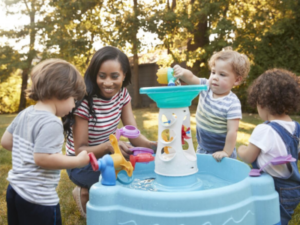Trauma-Informed Training for Early Childhood Education
Empower Educators to Create Safe, Supportive Spaces
Trauma experienced in the first few years of life has a profound and unique impact. During this sensitive period, a child’s brain forms over a million new neural connections per second. Many educators encounter young learners whose early lives have been deeply affected by trauma, yet they often lack sufficient training in trauma-informed care to respond effectively. Think Small Institute’s trauma-informed training empowers educators to address the immediate needs of affected children and their families while contributing to their long-term well-being and success.
Why should early childhood educators understand trauma-informed care?
- Children’s Vulnerability to Trauma
Early childhood is a critical period for development and trauma can deeply impact a child’s emotional, cognitive, and physical growth. When educators understand trauma and its potential effects, they can better support children who have experienced or are experiencing trauma.
- Promoting Emotional and Psychological Safety
Trauma-informed care is rooted in the principle of creating safe and supportive environments. Educators who are trauma-informed can create settings that feel emotionally safe for children, which helps mitigate the impacts of trauma.
- Building Trust and Relationships
Children who have experienced trauma may have difficulties with trust, relationships, and communication. Understanding trauma allows educators to approach children with empathy and patience, focusing on building trust through consistent, supportive, and predictable interactions.
- Reducing Re-traumatization
Without trauma-informed care, there is a risk of re-traumatizing children, even unintentionally. Practices that involve sudden changes, loud noises, or overly strict discipline can trigger negative reactions in children who have experienced trauma. A trauma-informed approach minimizes potential triggers and stressors, helping children feel safe and preventing further harm.
- Partnering with Families and Communities
Trauma often affects not just the child but the entire family. Educators who are knowledgeable about trauma-informed care can communicate effectively with families, offer resources, and collaborate with other professionals to support a child’s healing and development. This holistic approach benefits both the child and their family, fostering a sense of community and shared responsibility.



